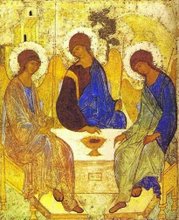Hospitality
Mother Teresa said that We can find God in two presance: The Eucharist, and our fellow neighbor.
Any visitor we get is the Lord and if we are not hospital we may miss a lot from him like Martha.
Taken from Sunday's reading, and explanation by Scott Hann from St. Paul Center.
Waiting on the Lord
Readings:
Genesis 18:1-10
Psalm 15:2-5
Colossians 1:24-28
Luke 10:38-42
God wants to dwell with each of us personally, intimately - as the mysterious guests once visited Abraham's tent, as Jesus once entered the home of Mary and Martha. By his hospitality in today's First Reading, Abraham shows us how we are to welcome the Lord into our lives. His selfless service of his divine guests (see Heb 13:1) stands in contrast to the portrait of Martha drawn in today's Gospel. Where Abraham is concerned only for the well-being of his guests, Martha speaks only of herself - "Do you not care that my sister has left me by myself...Tell her to help me." Jesus' gentle rebuke reminds us that we risk missing the divine in the mundane, that we can fall into the trap of believing that God somehow needs to be served by human hands (see Acts 17:25).Our Lord comes to us, not to be served but to serve (see Mt 20:28). He gave His life that we might know the one thing we need, the "better part" which is life in the fellowship of God. Jesus is the true Son promised today by Abraham's visitors (see Mt 1:1). In Him, God has made an everlasting covenant for all time, made us blessed descendants of Abraham (see Gen 17:19,21; Rom 4:16-17, 19-21). The Church now offers us this covenant, bringing to completion the word of God, the promise of His plan of salvation, what Paul calls "the mystery hidden for ages."As once He came to Abraham, Mary and Martha, Christ now comes to each of us in Word and Sacrament. As we sing in today's Psalm: He will make His dwelling with those who keep His Word and practice justice (see also Jn 14:23).If we do these things we will not be anxious or disturbed, will not have our Lord taken from us. We will wait on the Lord, who told Abraham and tells each of us: "I will surely return to you."
Thursday, July 19, 2007
Subscribe to:
Post Comments (Atom)



No comments:
Post a Comment